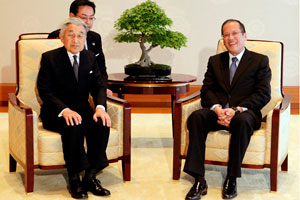Special to Fil-Am Megascene
MANILA (PhilAmPress) – Filipino Americans testified on September 26 before the joint hearing of the House committees on Suffrage and Foreign Affairs in support of House Bill 3201 amending the 2003 Overseas Absentee Voting Act that would eliminate the provision requiring overseas voters to sign an affidavit promising to return to the Philippines within three years or face the penalty of perpetual disbarment from future voting and up to one year in jail.

AQUINO AND JAPAN EMPEROR. President Benigno S. Aquino III exchanges pleasantries with His Imperial Majesty Emperor Akihito during the State Call at the Audience Room, Imperial Palace in line with his official working visit to Japan last September 28. Emperor Akihito acceded to the throne in 1989, the year the Chief Executive’s mother, the late President Corazon Aquino was invited to witness the emperor’s accession to the Chrysanthemum Throne.
“This heinous provision is the single most significant factor responsible the low registration of Filipino overseas voters,” said Rodel Rodis, president of the US Pinoys for Good Governance. “Granting overseas Filipinos the right to vote was a kiss on the cheek,” he said, “but adding the Affidavit to Return was a slap in the face.”
According to Commission on Elections (Comelec) Commissioner Armando Velasco, who attended the joint hearing at the Batasan, the registration applications of overseas Filipinos who did not check the box confirming the signing of the Affidavit to Return were rejected.
When House Suffrage Committee Chair Elpidio Barzaga, Jr. asked Velasco about the Comelec’s position on the Affidavit to Return, Commissioner Velasco disclosed that the Comelec commissioners informally agreed that the Affidavit provision should be removed.
“We want to encourage as many overseas Filipinos to register and vote in Philippine elections and this provision clearly discourages them from voting,” Velasco said.
Rodis said that in the 2010 presidential elections, around 589,830 Filipinos – out of 11 million overseas Filipinos registered to vote and only 300,000 actually cast their ballots. “Out of 4 million Filipinos in the US,” Rodis said, “only 100,000 actually voted.”
Loida Nicolas-Lewis, chair of the US Pinoys for Good Governance, testified about the practices of other countries which allow for overseas voting. “In all these cases, there was no biometric requirement,” she said. “Only the Philippine government requires its citizens to go to the consulate to personally register to vote and be fingerprinted.”
This biometric requirement means that Filipinos in outlying states would have to travel great distances at great expense to register and vote, she said.
Lewis recommended that overseas voters be allowed to register by mail by downloading the Comelec registration form from the Comelec website and mailing them to the nearest Philippine Consulate.
Dr. Jun Rasul, the president of the Philippine Medical Society of Washington DC, testified that the word “Absentee” should be removed from the Overseas Absentee Voting law because of its negative connotations. “An absentee voter means that we are not present when we vote,” he said. “If overseas voters have the right to vote, then why do we have to be considered absentee?” he asked.
After the testimonies of the Filipino American “resource persons” were taken, the members of the joint committees deliberated. Joining the joint committee members in their deliberations was Batasan House Speaker Feliciano Belmonte, Jr. who spoke in full support of the proposed amendments to the bill which included the elimination of the Affidavit to Return provision.
When the votes were taken, the joint committee members voted to eliminate the Affidavit to Return provision.
On the motion of Rep. Rufus Rodriguez, the joint committees voted to add the provision eliminating “Absentee” from the title of the bill. The joint committee members voted unanimously to support the added provision. House Bill 3201 will now called the Overseas Filipino Voting Act.
The joint committee members were not able to complete the deliberation and vote on the other proposed amendments when they voted to adjourn at 12:30 PM after convening at 9:30 AM.
Akbayan party-list Rep. Walden Bello, the principal sponsor of House Bill 3201, expressed confidence that “Filipinos all over the world will soon be able to participate in national elections – regardless of their location, and regardless of their intention to return to the Philippines.”
Bello said he believes that under a true democracy, elections must be as inclusive as possible, “with each and every Filipino partaking in the selection of the national leadership.”
Bello expressed confidence that the bill will become law in a few months with sufficient time for overseas Filipinos to register to vote in May 2013 Philippine elections.



 ShareThis
ShareThis